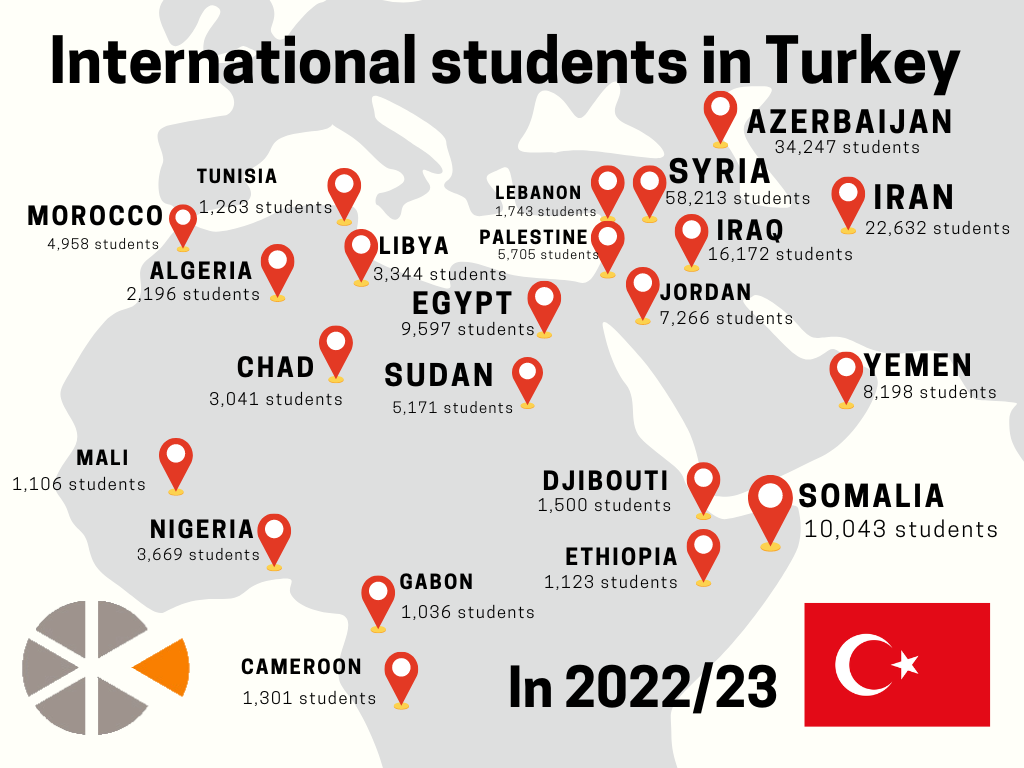More than 300,000 international students enrolled in Turkish universities in the 2022/23 academic year, reaching a target set by the Turkey Foreign Economic Relations Board (DEİK) last year.
A total of 301,694 non-Turkish students enrolled at institutions across the country in the last year, figures from the country’s Council of Higher Education (YÖK) show.
DEİK Education Economy Business Council president İrfan Gündüz said last year that Turkey was aiming to increase the number of international students it hosted to 300,000 by 2023.
In 2021/22, the country hosted a total of 260,289. Prior to the pandemic in 2018, reports suggested that Turkish president was hoping that the country would welcome 350,000 students but no timeline for reaching the target was given.
The latest figures are up from the 48,183 total international students recorded in Turkey in the 2013/14 academic year.
In 2022/23, 34 countries sent more than 1,000 students, with Syria (58,213 students), Azerbaijan (34,247), Iran (22,632), Turkmenistan (18,250) and Iraq (16,172) accounting for the most international enrolments.
Traditional source countries for major English-speaking destinations such as China and India only accounted for 1,445 and 549 students, respectively.
In recent years, Turkey has increased the number of scholarships for international, particularly among African students, and international students have been made exempt from admission examinations in certain courses.
Applications for international scholarships reached a record 165,000 in 2022.
Many students from the Middle East and North African region have enrolled at the country’s higher education institutions, the figure indicate.
There were 2,801 new admissions from Somalia, bringing the total to 10,043, Egyptian enrolments rose by 3,718 new enrolments to reach 9,597 students and 2,877 new Afghan students brought the total from the country where girls and women have been excluded from education to 9,203.
Other countries and regions accounting for more than 5,000 students include Kazakhstan (8,864), Yemen (8,198), Jordan (7,266), Palestine (5,705), Sudan (5,171) and Bulgaria (5,120).

Photo: The PIE News
Greece was the only other EU member state sending a significant number of students, with 2,614 enrolled across Turkey. Kosovo and Albania, neither of which are EU members, accounted for 1,190 and 1,051, respectively.
During Russia’s war on Ukraine, Turkey has been a destination Russian migrants – for those seeking to avoid sanctions, escape Vladimir Putin’s government or move their lives and assets overseas, according to the Washington Institute – and numbers are reflected in the YÖK statistics.
The number of Russians enrolled in universities across the country has almost doubled, with 1,457 new admissions bringing the total to 3,083.
Turkey’s economic crisis – with inflation hitting a 24-year high above 85% in October of 2022 – has resulted in a weak lira, which could have lessened costs for students coming from overseas.
Other countries sending significant numbers of students, include Uzbekistan with 4,794 students, Indonesia with 4,662, Pakistan with 4,171 and Kyrgyzstan with 2,026.
In total there were 103,498 new international admissions, bringing the total of international students in the country to 301,694. Male students made up 179,670 of international enrolments and 122,024 were female.
Anadolu University in the student city of Eskişehir hosted the most international students, with 16,441 enrolled.

Karabük University, founded in 2007 in the city in the Black Sea region of Turkey, hosted 11,908. Istanbul University welcomed 9,938, Ataturk University in the eastern city of Erzurum 9,164, Istanbul Medipol 7,380 and Kutahya Dumlupinar University 7,255.
The post Turkey hosting 300,000 int’l students appeared first on The PIE News.
